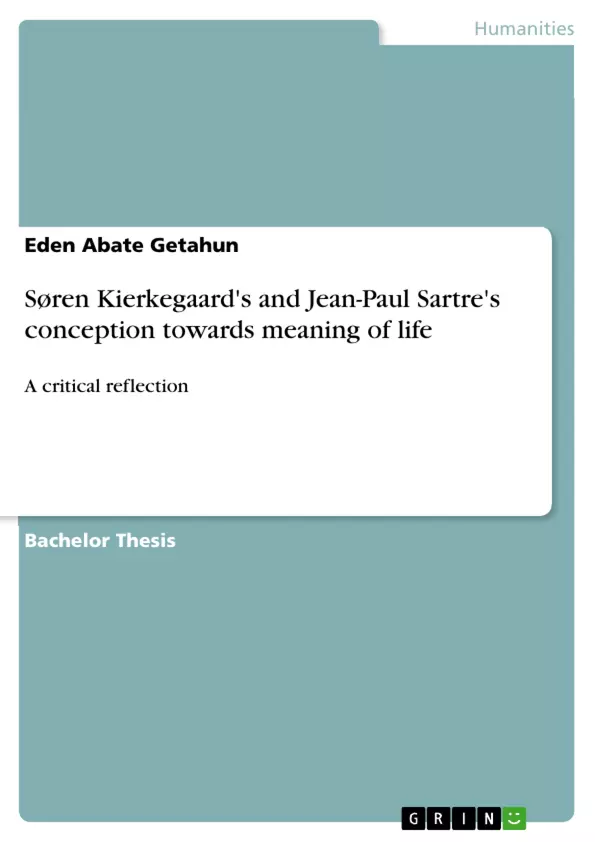The focus of this paper is to explore how existentialists have approached the question "What is meaning of life?" Throughout time this question has vexed humans. This study does so through recourse to the philosophies of Arthur Schopenhauer, Friedrich Nietzsche, Martin Heidegger, Albert Camus, and give more emphasis on Soren Kierkegaard and Jean-Paul-Sartre arguments. Therefore, the main purpose of this study is to analysis some existential philosophers’ arguments towards the meaning of life and to show how much the question of the meaning of life is influential.
This philosophical question "What is the meaning of life" is come as human exists and it has received especial attention in philosophy world many philosophers dealt with this question. In doing so, this senior essay discusses the main arguments of the above philosopher in detail. This paper gives kind of reminder or introduction for people to search their own meaning of life.
Table of Contents
- CHAPTER ONE
- 1. GENERAL INTRODUCTION
- CHAPTER TWO
- 2. THE ARGUMENTS OF SOME EXISTENTIALPHILOSOPHERS
- 2.1. EXISTENTIALIST IN RELATION TO MEANING OF LIFE.
- 2.1.2. ARTHUR SCHOPENHAUER'S ARGUMENT.
- 2.1.2. FRIEDRICH NIETZSCHE'S PERSPECTIVE
- 2.1.3 MARTIN HEIDEGGER'S ATTITUDE.
- 2.1.4 ALBERT CAMUS'S ATTITUDE..
- 2. THE ARGUMENTS OF SOME EXISTENTIALPHILOSOPHERS
- CHAPTER THREE
- 3. SOREN KIERKEGAARD AND JEAN-PAUL-SARTRE ARGUMENTS
- 3.1. SOREN KIERKEGAARD'S ARGUMENT.
- 3.2. JEAN-PAUL-SARTRE'S ARGUMENT
- 3. SOREN KIERKEGAARD AND JEAN-PAUL-SARTRE ARGUMENTS
- CHAPTER FOUR..
- 4. SUMMARY, REFELECTION AND CONCLUSION.
- REFERENCE
Objectives and Key Themes
This paper explores the existentialist perspective on the meaning of life. It examines how different existentialist philosophers, including Arthur Schopenhauer, Friedrich Nietzsche, Martin Heidegger, Albert Camus, Soren Kierkegaard, and Jean-Paul-Sartre, have addressed this fundamental question. The study aims to analyze their arguments and demonstrate the enduring influence of this inquiry.- Existentialism and its focus on existence over essence
- The individual's experience and the search for meaning
- Freedom, choice, and responsibility in shaping one's own existence
- The impact of existentialist thought on contemporary philosophy
- The enduring relevance of the question of the meaning of life
Chapter Summaries
- Chapter 1: Provides a general introduction to existentialism, defining its core principles and outlining its historical development. The chapter explores the significance of existence over essence and the role of human experience in understanding the meaning of being.
- Chapter 2: Delves into the arguments of key existentialist thinkers, including Arthur Schopenhauer, Friedrich Nietzsche, Martin Heidegger, and Albert Camus. It analyzes their perspectives on the meaning of life and examines their contributions to the existentialist discourse.
- Chapter 3: Focuses on the arguments of Soren Kierkegaard and Jean-Paul-Sartre, two of the most influential figures in existentialism. The chapter explores their unique perspectives on freedom, choice, and the individual's responsibility for creating meaning in a seemingly meaningless world.
Keywords
Existentialism, meaning of life, existence, essence, freedom, choice, responsibility, individual experience, Arthur Schopenhauer, Friedrich Nietzsche, Martin Heidegger, Albert Camus, Soren Kierkegaard, Jean-Paul-Sartre.- Quote paper
- Eden Abate Getahun (Author), 2019, Søren Kierkegaard's and Jean-Paul Sartre's conception towards meaning of life, Munich, GRIN Verlag, https://www.grin.com/document/505465



